A week later, the 'paper of record' fails to correct egregious 'paper ballots' error in endorsement editorial
Democratic Congressman's own website touts endorsement, repeats same fictitious information about bill...
 It was a "glaring inaccuracy," according to VotersUnite.org's Ellen Theisen last week.
It was a "glaring inaccuracy," according to VotersUnite.org's Ellen Theisen last week.
Yet, even though it's been more than a full week since the New York Times ran an editorial endorsing Rep. Rush Holt (D-NJ)'s new election reform bill (H.R. 2894), in which they included a huge factual error about the legislation, they have failed to issue a correction. Neither have they even bothered to respond to letters to the editor detailing the error, sent to them when we first pointed out the problem last week.
While several aspects of their editorial misled readers about the bill, as we detailed in our original article, one assertion made by the "paper of record" was just out and out incorrect, when they erroneously asserted the following:
Mr. Holt's bill would require paper ballots to be used for every vote cast in November 2010.
On that point, the Times is just plain wrong. Any reading of the bill would quickly reveal as much. Theisen would later call it a "complete misrepresentation."
While the bill, as currently written, would require Direct Recording Electronic (DRE, usually touch-screen) voting machines to print "paper trails" (otherwise known as "voter verifiable paper audit trails" or "VVPAT") by 2010, it decidely does not "require a paper ballot to be used for every vote cast in November 2010." Paper ballots for every voter will not be required by Holt's bill, as it's currently written, and as it's been introduced in the House, until 2014. That's two federal elections away, including one Presidential election. The Times is off by four years in their assertion.
That the NYTimes --- again, known as the "paper of record" for a reason --- would get something as important as that blatantly wrong in an editorial endorsing such a sweeping piece of legislation, is rather incredible in the first place. That they've not bothered to issue a correction, or even respond to a letter pointing out the error, is mind-boggling.
But their appears at least one reason --- though hardly an excuse --- that the Times might have gotten it so wrong. Congressman Holt makes the same wholly erroneous assertion about his own bill on his own Congressional webpage...
--- Click here for REST OF STORY!... ---
 "What is a vote worth?" Venango County, PA's Election Board Chairman Craig Adams, a Republican, asked last week. "If the vote is counted it is priceless. If it is not counted, I don't care what it costs. Let's get a right."
"What is a vote worth?" Venango County, PA's Election Board Chairman Craig Adams, a Republican, asked last week. "If the vote is counted it is priceless. If it is not counted, I don't care what it costs. Let's get a right."

 Court Blocks Hegseth Censure of Sen. Mark Kelly
Court Blocks Hegseth Censure of Sen. Mark Kelly Harpy Tantrums, Legal Losses, Election Fails, Retreating ICE and Other Hopeful Signs: 'BradCast' 2/12/26
Harpy Tantrums, Legal Losses, Election Fails, Retreating ICE and Other Hopeful Signs: 'BradCast' 2/12/26 'Green News Report' 2/12/26
'Green News Report' 2/12/26
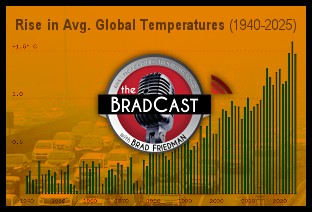 'Let Kids with Asthma Suffer': Trump to Reverse EPA's Landmark 'Endangerment Finding': 'BradCast' 2/11/26
'Let Kids with Asthma Suffer': Trump to Reverse EPA's Landmark 'Endangerment Finding': 'BradCast' 2/11/26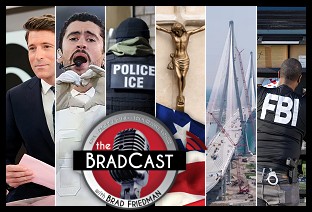 Trump's Presidency Now About Little More Than Racism, Corruption, Culture War Nonsense: 'BradCast' 2/10/26
Trump's Presidency Now About Little More Than Racism, Corruption, Culture War Nonsense: 'BradCast' 2/10/26 'Green News Report' 2/10/26
'Green News Report' 2/10/26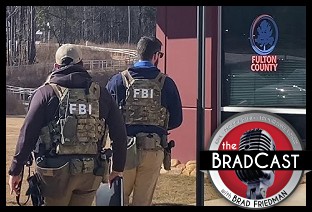 About Trump's FBI Raid of the Fulton County, GA Elections Warehouse: 'BradCast' 2/9/26
About Trump's FBI Raid of the Fulton County, GA Elections Warehouse: 'BradCast' 2/9/26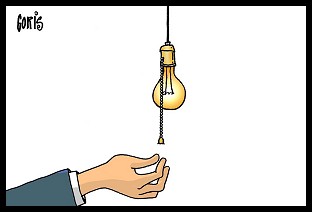 Sunday 'Dead in Darkness' Toons
Sunday 'Dead in Darkness' Toons 'New START' Treaty Allowed to End Amid New World Disorder: 'BradCast' 2/5/26
'New START' Treaty Allowed to End Amid New World Disorder: 'BradCast' 2/5/26 'Green News Report' 2/5/26
'Green News Report' 2/5/26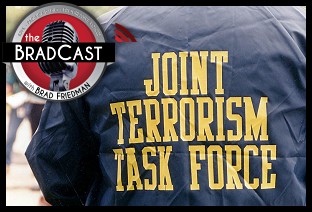 Trump Turns 'War on Terror' Tools Against Domestic Political Foes: 'BradCast' 2/4/26
Trump Turns 'War on Terror' Tools Against Domestic Political Foes: 'BradCast' 2/4/26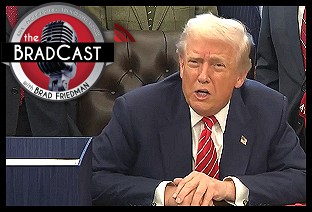 Losing Legally and Politically, Trump Threatens to 'Nationalize' Elections: 'BradCast' 2/3/26
Losing Legally and Politically, Trump Threatens to 'Nationalize' Elections: 'BradCast' 2/3/26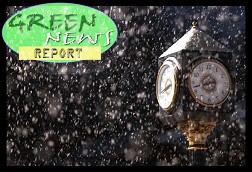 'Green News Report' 2/3/26
'Green News Report' 2/3/26 Bad and Good Bunnies, and an Electoral Shock in Deep 'Red' TX: 'BradCast' 2/2/26
Bad and Good Bunnies, and an Electoral Shock in Deep 'Red' TX: 'BradCast' 2/2/26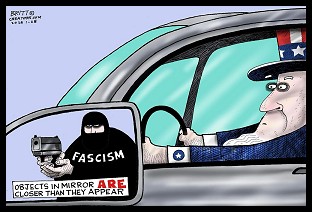 Sunday 'Mirror, Mirror' Toons
Sunday 'Mirror, Mirror' Toons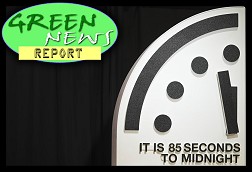 'Green News Report' 1/29/26
'Green News Report' 1/29/26 It's About Elections and the Windmills of His Mind: 'BradCast' 1/29/26
It's About Elections and the Windmills of His Mind: 'BradCast' 1/29/26 Govt Shutdown Over ICE Funding Near Certain This Weekend: 'BradCast' 1/28/26
Govt Shutdown Over ICE Funding Near Certain This Weekend: 'BradCast' 1/28/26 Trump Blinks, Bovino Out, MN Op Falters, Persists as Midterms Loom: 'BradCast' 1/27
Trump Blinks, Bovino Out, MN Op Falters, Persists as Midterms Loom: 'BradCast' 1/27  The ICE Murder of ICU Nurse Alex Pretti and the Heroes of Mpls: 'BradCast' 1/26/26
The ICE Murder of ICU Nurse Alex Pretti and the Heroes of Mpls: 'BradCast' 1/26/26  The BRAD BLOG: 22 Years and Still Counting
The BRAD BLOG: 22 Years and Still Counting Mr. Smith Testifies (Publicly) in Washington: 'BradCast' 1/22/26
Mr. Smith Testifies (Publicly) in Washington: 'BradCast' 1/22/26 World Turning Against Self-Destructing U.S. Under Trump: 'BradCast' 1/21/26
World Turning Against Self-Destructing U.S. Under Trump: 'BradCast' 1/21/26 Trump Waste, Fraud, Abuse on Voting, at DOJ, by DOGE: 'BradCast' 1/20/26
Trump Waste, Fraud, Abuse on Voting, at DOJ, by DOGE: 'BradCast' 1/20/26
 VA GOP VOTER REG FRAUDSTER OFF HOOK
VA GOP VOTER REG FRAUDSTER OFF HOOK Criminal GOP Voter Registration Fraud Probe Expanding in VA
Criminal GOP Voter Registration Fraud Probe Expanding in VA DOJ PROBE SOUGHT AFTER VA ARREST
DOJ PROBE SOUGHT AFTER VA ARREST Arrest in VA: GOP Voter Reg Scandal Widens
Arrest in VA: GOP Voter Reg Scandal Widens ALL TOGETHER: ROVE, SPROUL, KOCHS, RNC
ALL TOGETHER: ROVE, SPROUL, KOCHS, RNC LATimes: RNC's 'Fired' Sproul Working for Repubs in 'as Many as 30 States'
LATimes: RNC's 'Fired' Sproul Working for Repubs in 'as Many as 30 States' 'Fired' Sproul Group 'Cloned', Still Working for Republicans in At Least 10 States
'Fired' Sproul Group 'Cloned', Still Working for Republicans in At Least 10 States FINALLY: FOX ON GOP REG FRAUD SCANDAL
FINALLY: FOX ON GOP REG FRAUD SCANDAL COLORADO FOLLOWS FLORIDA WITH GOP CRIMINAL INVESTIGATION
COLORADO FOLLOWS FLORIDA WITH GOP CRIMINAL INVESTIGATION CRIMINAL PROBE LAUNCHED INTO GOP VOTER REGISTRATION FRAUD SCANDAL IN FL
CRIMINAL PROBE LAUNCHED INTO GOP VOTER REGISTRATION FRAUD SCANDAL IN FL Brad Breaks PA Photo ID & GOP Registration Fraud Scandal News on Hartmann TV
Brad Breaks PA Photo ID & GOP Registration Fraud Scandal News on Hartmann TV  CAUGHT ON TAPE: COORDINATED NATIONWIDE GOP VOTER REG SCAM
CAUGHT ON TAPE: COORDINATED NATIONWIDE GOP VOTER REG SCAM CRIMINAL ELECTION FRAUD COMPLAINT FILED AGAINST GOP 'FRAUD' FIRM
CRIMINAL ELECTION FRAUD COMPLAINT FILED AGAINST GOP 'FRAUD' FIRM RICK SCOTT GETS ROLLED IN GOP REGISTRATION FRAUD SCANDAL
RICK SCOTT GETS ROLLED IN GOP REGISTRATION FRAUD SCANDAL VIDEO: Brad Breaks GOP Reg Fraud Scandal on Hartmann TV
VIDEO: Brad Breaks GOP Reg Fraud Scandal on Hartmann TV RNC FIRES NATIONAL VOTER REGISTRATION FIRM FOR FRAUD
RNC FIRES NATIONAL VOTER REGISTRATION FIRM FOR FRAUD EXCLUSIVE: Intvw w/ FL Official Who First Discovered GOP Reg Fraud
EXCLUSIVE: Intvw w/ FL Official Who First Discovered GOP Reg Fraud GOP REGISTRATION FRAUD FOUND IN FL
GOP REGISTRATION FRAUD FOUND IN FL



















 [Update 12/22/10: Alaska Supreme Court decides against Joe Miller on all counts.
[Update 12/22/10: Alaska Supreme Court decides against Joe Miller on all counts.  Over the weekend, Republican Sen. Lisa Murkowski
Over the weekend, Republican Sen. Lisa Murkowski  One of the basic axioms of law is that fraud vitiates consent. One of the foundational principles of democratic governance is that legitimacy rests on the informed consent of the governed. Come November, those principles will be tested in California.
One of the basic axioms of law is that fraud vitiates consent. One of the foundational principles of democratic governance is that legitimacy rests on the informed consent of the governed. Come November, those principles will be tested in California. While barreling westward across the Great Plains yesterday, I received an urgent text message from Bev Harris of the non-partisan election integrity watchdog organization
While barreling westward across the Great Plains yesterday, I received an urgent text message from Bev Harris of the non-partisan election integrity watchdog organization 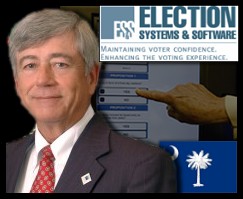 Judge Vic Rawl just released
Judge Vic Rawl just released  In 2008, election integrity advocates in Tennessee won a hard and long-fought victory as the state legislature finally passed, on a bi-partisan basis, the
In 2008, election integrity advocates in Tennessee won a hard and long-fought victory as the state legislature finally passed, on a bi-partisan basis, the  It's been nearly a month since the New York Times
It's been nearly a month since the New York Times  It was a "glaring inaccuracy," according to VotersUnite.org's Ellen Theisen
It was a "glaring inaccuracy," according to VotersUnite.org's Ellen Theisen  The New York Times just doesn't get it. You'd think, by now, they would. But they don't. And they should print a correction immediately.
The New York Times just doesn't get it. You'd think, by now, they would. But they don't. And they should print a correction immediately. Due, in no small part, to the concerns expressed in
Due, in no small part, to the concerns expressed in  Okay, so I've been asked on several occasions, since the election last year, what I regard as the top priorities for election reform in the U.S. of A. In hopes of keeping it simple, stupid, at least until I hear opinions on these back from you folks, here is a summary list of the most important, and most eminently-doable-at-the-federal-level reforms as I see it.
Okay, so I've been asked on several occasions, since the election last year, what I regard as the top priorities for election reform in the U.S. of A. In hopes of keeping it simple, stupid, at least until I hear opinions on these back from you folks, here is a summary list of the most important, and most eminently-doable-at-the-federal-level reforms as I see it.












